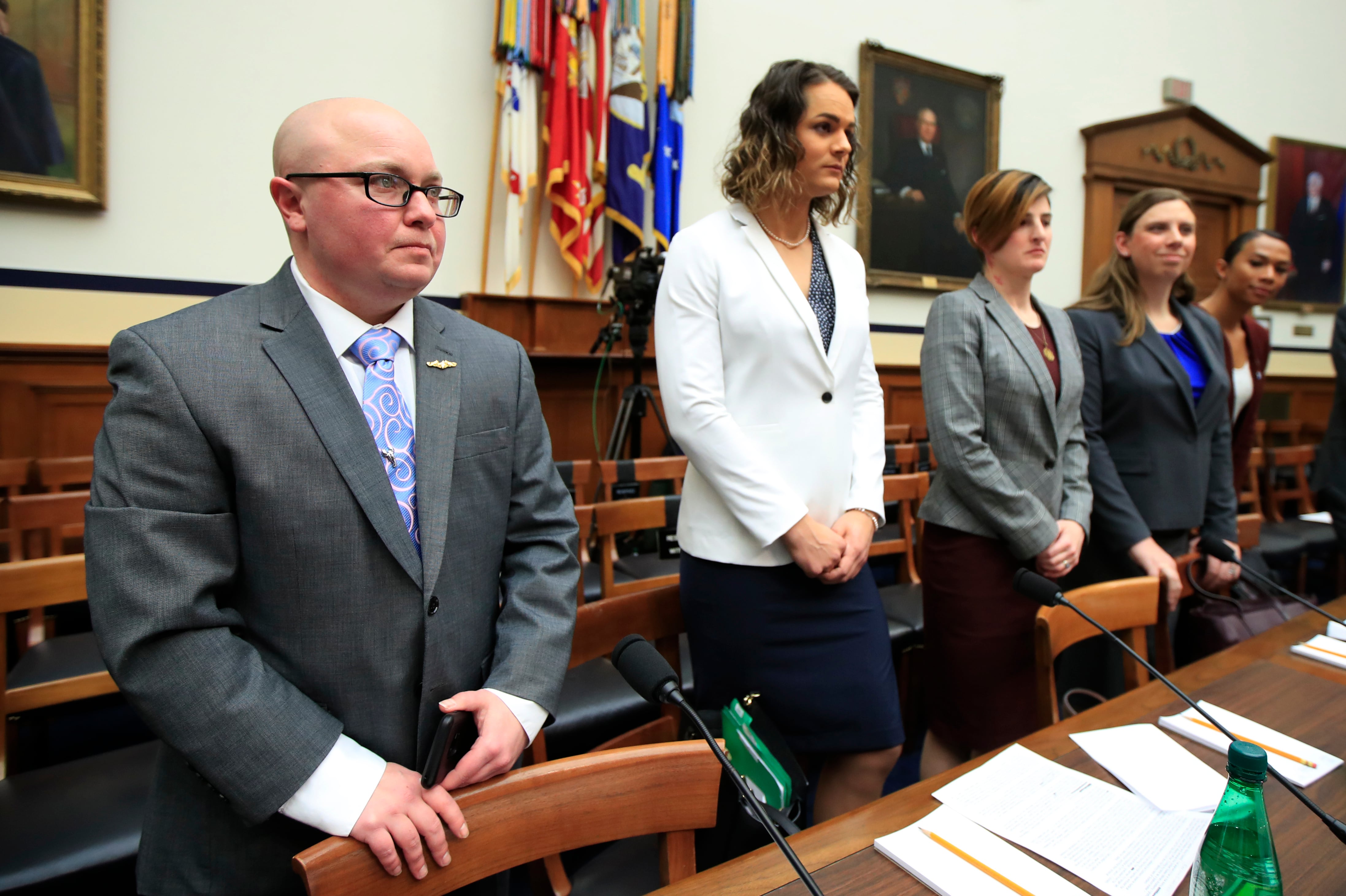FORT MEADE, Md. — The warrior creed goes leave no soldier behind.
This is the mission of Fort Meade Army Reserves lawyer Deirdre Hendrick and Navy Petty Officer First Class Alice Ashton in their effort to save as many careers as they can of the thousands of fellow transgender military members left behind in the ban on transgender service members.
Hendrick and Ashton, both stationed at Fort Meade, knew the ban had been coming since President Donald Trump tweeted about it in July 2017, but with nationwide lawsuits it wasn’t clear until March 12 that the ban would officially kick in on April 12.
RELATED

Having both faced challenges as transgender women in the military, Hendrick and Ashton jumped in with peer support network SPART*A (Servicemembers Partners Allies for Respect and Tolerance for All), to try and help 18 transgender service members keep their jobs before they would be banned.
Anyone with a diagnosis of gender dysphoria or a contract to join and diagnosis prior to April 12 was grandfathered into the military. Gender dysphoria, often referred to as transgender, is when a person’s assigned gender at birth does not match the gender they identify with. Anyone seeking to medically transition from then on will be separated, or effectively banned.
When she heard about the ban taking effect, Hendrick immediately called her unit.
“I said, ‘Look, these people are going to get kicked out if they don’t get this fixed by this date. I feel morally obligated to help them,’” Hendrick said.
RELATED

Helping service members get a diagnosis and verify transition paperwork with all necessary offices — which required constant phone calls, emails and even in-person visits to military bases — were partially part of Hendrick’s job as a Reserves lawyer. But she and Ashton want to be clear that they’re only speaking for themselves, not on behalf of the military.
“Normally this process, if it goes by in three months it’s considered fast,” Ashton said. “We had 30 days.”
For a transgender person to get grandfathered into the military, they needed to see multiple doctors and develop a transitioning plan that then needed to be signed by multiple military leaders across different offices — some of which only work on weekends.
To get their diagnoses on time, Ashton had active duty members go to nearby bases every day to ask about cancellations for appointments.
“We had to push these people and get a hold of doctors,” Hendrick said.
To add to the time crunch, there was confusion.
Hendrick and Ashton said military surgeon’s office employees and leadership didn’t know when the ban’s deadline was or thought the policy might not start because of court injunctions.
“Deirdre took a lot of time to call units and say ‘I need this person’s signature and I need it now,’ and keep moving it up and up and up,” Ashton said.
Sometimes the person who needed to sign off on a memo would be on leave, and then that person’s alternate would be on leave. If forms weren’t properly prepared, the surgeon would kick them back.
Even by the last week before the deadline, Hendrick and Ashton said some leaders thought if the paperwork was just started the trans members would be exempt, or they thought the ban wasn’t going to kick in for sure on the 12th. Hendrick and Ashton said they still hadn’t convinced some people they needed signatures by the morning of April 11.
“The afternoon of the 11th, it’s getting later and later and this guy is saying, ‘I’m working on these but I can only go so fast. Why are you worrying about this?’ And even questioned whether these were even my clients,” Hendrick said.
“We were all really on edge. I was telling my clients, ‘Look I’m no longer confident. I really don’t know where this is going. Prepare for the worst.’”
And still, more requests came in. One service member only got a diagnosis a week before the deadline. One contacted Hendrick on the evening of April 11 with no documentation.
It wasn’t until 6 p.m. on April 11 that Hendrick and Ashton said the reserves command surgeon promised the last five packets in question would all be exempt from the policy. Hendrick and Ashton said they both broke down crying.
“Every day since then it’s been a little bit better but it’s almost like a grieving process with survivor’s guilt,” Ashton said. “I just had to come to terms that I did everything and helped everyone I could. I can live with the fact that I did my best.”
Hendrick said it wouldn’t be possible for the Army to pay her for all the hours she put in over those 30 days. This was the hardest thing she’s ever done as a lawyer and an Army officer, she said, including serving a combat tour in Iraq.
She’s worried about people who are only just realizing they’re transgender. Hendrick came out at 46 years old and hadn’t known of a trans person other than on television before 2014. She said one of her clients realized they were trans after seeing congressional testimony from a trans military member.
“When I realized what was going on with me, I was like ‘I have to transition now, even if it ruins my career. I’ve been alive for 46 years and I have not experienced life as who I truly am. I need to do this,’” Hendrick said.
Hendrick and Ashton both transitioned in 2016 and said their jobs required them to dress and act as the gender they were assigned at birth, even while transitioning. Ashton said this led her to a dark period where she self-medicated with alcohol. Hendrick said her transition paperwork got rejected on the first try, even as a military lawyer.
“To think this could be happening to a service member right now or a year from now . . . I really, really worry about it a lot,” Hendrick said.
Elliot Sommer, Jax Ullrich, Alex Tafolla are a few of those service members who credit Ashton and Hendrick with saving their careers.
Sommer, 21, an Army Reserve officer in Indianapolis, waited to get the paperwork in his own hands before it all felt real.
“I just follow what’s in that packet and do my job, follow my duties and meet and exceed expectations. There’s nothing different about me as a soldier,” Sommers said. “I’m still meeting and exceeding standards.”
Ullrich, 32, an Army Reservist in Round Rock, Texas, said that while his command is supportive, this process has felt like the “don’t ask, don’t tell” policy all over again.
“It’s history repeating itself. It’s sad that we’re going back to this again,” Ullrich said. “When I let my coworkers know I’m transitioning from female to male, my leadership straight up told me, ‘You’re a good soldier. How do we keep you in?’ It didn’t even matter that I was transgender to them.”
Tafolla, 33, a construction operations supervisor for the Army in San Antonio, Texas, said he owes Hendrick his life. His paperwork was one of those five packets held up on the last day before the deadline.
“The government is making the public believe (being transgender) is a big deal when it’s not,” Tafolla said. “The people in the military are very welcoming and they’re like, ‘Why is this a big deal? Go back to work.’ They’re focused on the important stuff like readiness and training.”
Fort Meade spokeswoman Mary Doyle said Fort Meade will implement the Department of Defense policy that no individual will be excluded or removed from service solely based on gender identity.
“Fort Meade remains committed to treating all individuals with dignity and respect while ensuring readiness, deployability and lethality,” she said.
There are waivers for people who didn’t get their packets accepted on time, but Hendrick and Ashton said getting those accepted would be even more difficult than it was before the deadline.
“We don’t want to leave any service member behind. We helped 15 people but that’s a drop in the bucket,” Ashton said. “I mourn each person who is not able to be themselves, who is not able to transition or who loses their job because of who they are.”
Information from: The Capital





